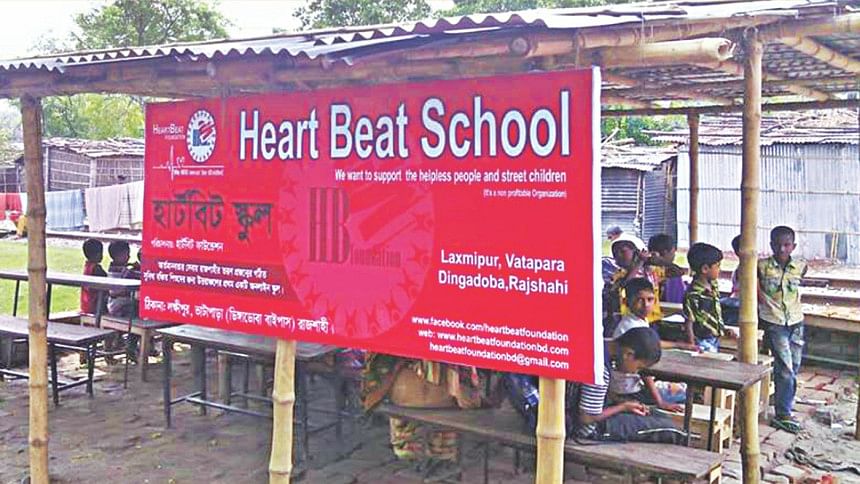School of hope

"My father left my mother when I was two," says seven-year-old Shimu, unemotional, as though she were speaking of a routine matter. "When I was five I was caught by some men outside the shanty in the railway colony where I lived with my mother. They blindfolded and gagged me; and soon I could hear my mother crying."
"But nobody came to rescue us. I fell unconscious after that, and when I woke the following morning I was there in our hut, but there was no sign of mother. I've been looking for her ever since," she says, increasingly teary-eyed.
Other slum-dwellers told Shimu that her mother committed suicide, but having never seen her dead body, Shimu is unconvinced. "Why would mother leave like that?"
In the midst of these desperate circumstances Shimu found a dream. "I want to be a TV journalist," she says. "As a journalist I can search the country until I find my mother."
Among Rajshahi's most deprived children big dreams are common. Rocky, about the same age, wants to be a judge. His father was murdered in 2013, in the days of countrywide political violence. He wants to try his father's killers.
Rima, meanwhile, hopes to be a doctor. "As a doctor I could serve the poorest people for free," says the ambitious seven-year-old.
The world is not made for children like Shimu, Rocky and Rima. It is not made for their dreams. Street children like them, usually, have no chance to achieve lofty life goals.
But in Rajshahi there is a bunch of youths, older and at greater advantage, who are pursuing a dream of their own: to educate the city's underprivileged children.
We meet the children beside the railway line near Kashiyadanga Bypass in the city's outskirts. Nearby is a bamboo hut, unremarkable were it not for the classroom of the Heartbeat School, now in its third year. In this humble environment the three children study, taking the first basic steps towards achieving accomplished adult lives.
"Our goal is to spread the light of education among street children," says Shahriar Rahman. He is studying in the third year of his business administration degree. Together with other 23 like-minded, all pursuing tertiary education in subjects ranging from engineering to medicine, he established the Heartbeat Foundation on 5 December, 2012.
"We want to stand beside the downtrodden," he says of the foundation's goals. "We will engage with our fellow citizens."
Interestingly, it's not friendship that the foundation members share as much as their willingness to work towards the society's betterment. Their effort becomes all the more commendable as it has been initiated by young people yet to embark upon their own careers.
"We want our students to fulfil their dreams," says Arna Jaman, chief executive officer of the Heartbeat Foundation about the school, "We expect them to get good jobs in the country and abroad."
Currently, the school, situated on a donated site of railway land organised by Md Halim, has 35 students studying in classes 1 to 3. It is the only registered school for street children in North Bengal of Bangladesh.
Books and stationery are provided for free by foundation members, who also dig into their pockets to pay a monthly 'subscription fee' of Tk 100 to cover basic running costs.
"We have managed school uniforms and shoes for fifteen students so far," says Sadman Soumik, the Heartbeat Foundation general secretary. "We are trying to manage the same for the rest as soon as possible."
Classes run five days a week, with students studying Bangla, English, mathematics and general knowledge in the morning, and receiving religious instruction from local Imam, Ashraf Ali, including Arabic language classes, in the evening.
In addition, the foundation has been able to enlist the assistance of Milla Rahman, an American entrepreneur of Bangladeshi origin and Mahmud Khairul, a telecommunications student of Malay university in Malaysia. Twice a week these two conduct classes for the school online, which the youngsters find particularly exciting.
"We do face problems with internet speed and connectivity," says Rahman, "which is why online classes feature only twice a week. Another challenge is that some of the students have taken jobs in shops or restaurants to help their families. We have to work harder to encourage parents to keep them in school."
The future goals of the Heartbeat Foundation are not meagre. "We want to launch five online schools in Rajshahi by 2021 so that all the city's street children have the opportunity for education. But how it will be implemented we are not sure."
"We have sought cooperation from different corners to run our school smoothly," says Heartbeat Foundation president Elias Bin Kashem, "and we conduct other activities like blood donation, providing meals for street children twice a year and youth leadership training."
At being home to young people prepared to take a lead in the betterment of society, such as those involved with the Heartbeat Foundation, Rajshahi is undoubtedly blessed. Through projects like the Heartbeat School which can unlock the otherwise lost potentials in a coming generation, it's a city with a future that's brighter still.
Back at the classroom, young Sumon dreams of becoming a police officer. "I will punish people who do bad deeds," he says. Hakim, Utsho and Parvez meanwhile hope to be politicians. They want to shape a better nation.

 For all latest news, follow The Daily Star's Google News channel.
For all latest news, follow The Daily Star's Google News channel. 



Comments